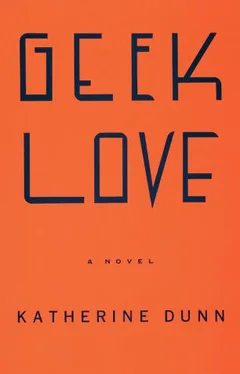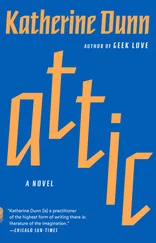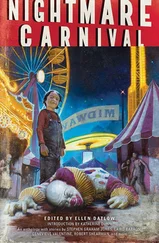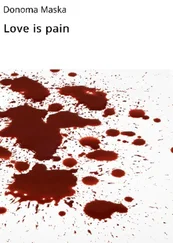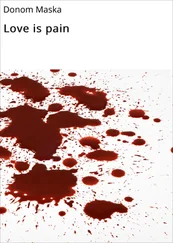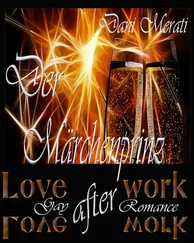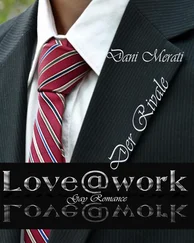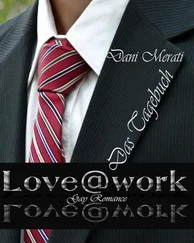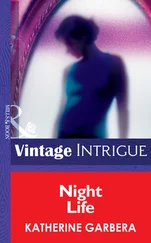I reach for the lever on the ice-cube dispenser and she is behind me, her big hand swooping past my head to hoist the bucket from me, tuck it up under the spout. Ice rattles out.
“Are these dinners from your plant?”
“Turkey, dressing, pumpkin custard, whipped spuds, gravy. I don’t like cranberries.”
“Thanksgiving dinner.”
“Twenty-six Thanksgivings in here. That’s all I eat. Nine hundred calories each. So why am I so big?”
The freezer is sighing out vapor. She slips the door closed and stands staring at the gleaming cold cooking range with its dark oven glass.
“Lately I’ve been eating popcorn instead. Want some?”
She sits on the footstool in front of the fire, long-handled wire screen basket in her hand. The hard yellow kernels in the basket are sliding and bouncing as she quivers her wrist deliberately. The coals below the big chunks of wood flicker black and red and a soft glare reaches up to the basket. The first kernel of corn hisses and jumps, flowering suddenly into a speck of white, then the birdshot peppering as the rest of the kernels go. She watches carefully.
She has a two-quart steel bowl full of popcorn in her lap — a shaker of brewer’s yeast on the tray next to the Irish whiskey. She is slowly scooping up popcorn in a big soup spoon and sliding it into her mouth.
“I use a spoon because the yeast sticks to my fingers,” she says. “It’s gritty.”
I lift my glass, full again, and stare through liquid at the fire.
She talks. People talk easily to me. They think a bald albino hunchback dwarf can’t hide anything. My worst is all out in the open. It makes it necessary for people to tell you about themselves. They begin out of simple courtesy. Just being visible is my biggest confession, so they try to set me at ease by revealing our equality, by dragging out their own less-apparent deformities. That’s how it starts. But I am like a stranger on the bus and they get hooked on having a listener. They go too far because I am one listener who is in no position to judge or find fault. They stretch out their dampest secrets because a creature like me has no virtues or morals. If I am “good” (and they assume that I am), it’s obviously for lack of opportunity to be otherwise. And I listen. I listen eagerly, warmly, because I care. They tell me everything eventually.
The popcorn is long gone, the fire is dying, and she has decided to show me her life’s work—“My real work,” she says — and I feel quite calm, carrying my glass and following her. We have brought the bottle with us but decided we could dispense with the ice. The room has no windows. We have come in through the only door, which is disguised as a locked closet in the bathroom. Only her key will open it.
She gives me the only chair, solid wood, no cushion. A working chair. The whole room is set up for only one person to move in. It is small and lined with racks holding film disks and video cassettes. The screen fills one whole wall. The rest is a battered desk and a bank of filing cabinets. She plods from rack to control panel, talking calmly. She has dropped the rough cheer of her poolside manner. Her tongue is slightly thick in her mouth but she is, I can tell, herself. Her big somber face is intent. She talks as she works.
“People always assume I’m a lesbian. I’m not. I have no sex at all that I know of. No interest, no inclination. Never have. But it’s understandable that I give that impression. It doesn’t bother me.”
The screen fills with the image of a woman bent over a computer panel. She seems unaware of the camera. Her hands move rapidly over the control board. She picks up a pedestal microphone and speaks into it. Her face turns toward the camera eye for the first time. She stares past me. Her face is puckered with scar tissue, one eye nearly obliterated by the alien smoothness. Her mouth is distorted into a pulsing gash on one side of her face. As she turns back to the keyboard I notice that she has no eyebrows or lashes and she is wearing a short, curly brown wig.
“This is Linda,” said Miss Lick. “I went to school with her. She was pretty. Her family comfortable but not rich. A nice girl. Miss Popularity. She put everything into baton twirling, and dates. She was a cheerleader every year from the seventh grade on. Average student. The boys were all over her. She was the oldest of five. Her brothers and sisters were quite a bit younger. She adored them. When we were sophomores she was a princess for every dance and festival. I wasn’t one of her good buddies. Never spoke to her. Then one night in the winter of our sophomore year she was babysitting for the little ones while her parents went out. They were all sitting in front of the fireplace in the family room in their nightgowns. They were roasting marshmallows and telling ghost stories.
“I’ve thought of this so often, visualized this scene. Linda had long hair all the way to her ass. They had all bathed and she was brushing her hair dry and entertaining the little ones.”
On the screen the woman at the computer reaches for the spewing readout. The machine is vomiting fold after fold of perforated paper, thickly printed. She scans it quickly, folding it in front of her in a mounting pile as it rolls out.
“Linda’s hobby was sewing. She’d made all the children’s nightgowns and her own as well. She didn’t use flame-retardant material. She was young, you know. Not thinking. Her mother didn’t ask about it. Never occurred to her.”
The scarred woman on the screen rips the end of the printout from the computer, picks up the stack, and gets up from her chair. She turns her back and limps out of the camera’s range.
“Well, to shorten the tale, there was a fire — spark caught in one of the little ones’ robes. Up it went. Linda saved the child, caught fire herself in the process — ran outside to keep from lighting up any of the others. Went up like a torch, I understand. Long nightgown, long robe, her hair. She was in the hospital for a long time. Lots of grafts. Amazing how much damage was done.
“She refused a lot of the plastic surgery. Expensive. She felt guilty. Her parents had all those little ones to bring up. She said she’d get it done later when she could earn it herself. Parents tried to persuade her but she was fierce about it. When she came back to school she was as she is now, scarred from stem to stern. Different girl entirely from what she had been. Old pursuits, interests, wiped out entirely. Friends tried to be polite but she made them nervous. Boys all gone west as far as she was concerned. Interesting to see the change. She seemed to have taken in the situation completely while she was still in the hospital. Turned her head around. She studied. All that old energy of hers turned to books. Realized, you see, that she couldn’t rely on being cute and catching a man — that the life she’d expected was out of reach. But she didn’t give up. She made another life — all brain stuff. I admired her. We got to be friends. Still see her. She’s a chemical engineer. Done some innovative research. Won prizes. She’s told me time and again that the fire was the best thing that could have happened to her.”
The camera sweeps over the lifeless computer room. Another camera takes over. An office. The woman in the wig faces the camera. She is sitting at a desk comparing the printout with another sheet of paper. Her forehead only wrinkles on one side. Then we are in a kitchen. Same woman without her white lab coat. She is wearing a bulky sweater, reaching into an open microwave oven and pulling out a plastic-covered tray like the ones in Miss Lick’s freezer.
The tape ends and the screen goes to grey static.
“It’s not that surprising when you think about the precedents.” Miss Lick is philosophical. “Crippled painters and whatnot. Remember the Arturans roaming the country years ago?”
Читать дальше
